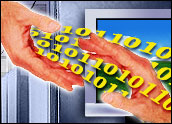
Anyone who sells, advertises or distributes peer-to-peer (P2P) softwarewithout taking “reasonable care” that the software won’t be used for anunlawful act would be slapped with a fine up to US$2,500, a year in county jailor both under a bill filed in the California Senate last week.
Although the measure, filed by Sen. Kevin Murray, D-Los Angeles, is aimed atpunishing people illegally trafficking in music, movies and child porn onthe Internet, critics of the legislation contend it goes far beyond itsoriginator’s purported intentions.
Anti-Technology Measure
“The purpose of the law is to reduce illegal activity that is happening onpeer-to-peer sites, all the way from kiddie porn to copyright violations,”Murray told TechNewsWorld.
“In previous cases,” he noted, “judges have held that services are notliable for underlying crimes, which I think is absolutely correct.” However,he argued that the P2P industry’s feet should be held to the fire when itcomes to policing its networks. “If you distribute peer-to-peer software andit’s reasonably possible for you to add features that block out illegalactivity, then we think you have a responsibility to do so.”
Opponents of the bill, however, maintain that it’s overly broad and couldhave a disastrous impact on the Golden State’s high-tech industry.
“It’s an astonishingly sweeping and antitechnology proposal that doesn’tappear to have been well thought out,” declared Adam Eisgrau, executivedirector of P2P United, a peer-to-peer industry group located in Washington,D.C.
Broad Definition
What makes the bill so sweeping is its definition ofpeer-to-peer software, which reads as follows:
“[S]oftware that once installed and launched, enables the user to connecthis or her computer to a network of other computers on which the users ofthese computers have made available recording or audiovisual works forelectronic dissemination to other users who are connected to the network.When a transaction is complete, the user has an identical copy of the fileon his or her computer and may also then disseminate the file to other usersconnected to the network.”
Almost any networking software is included in the definition, maintainedJason Schultz, a staff attorney with the Electronic Frontier Foundation inSan Francisco. “So it includes Web browsers, instant messaging — all kinds ofInternet software,” he told TechNewsWorld.
Unprecedented Law
“It is an unprecedented law,” he said. “It is going to affirmativelymandate how tech companies design software. It’s going to force them tothink of every possible, conceivable illegal use and try to design some wayto prevent it. It’s going to be madness.”
Eisgrau maintained that the bill accomplishes through law what theentertainment industry, which has been gored by file-sharing on P2Pnetworks, has been unable to do in the courts. “It’s a transparent way ofimposing with criminal law a requirement that the motion picture andrecording industries have been clamoring for,” he said, “that peer-to-peersoftware companies redesign their software to make them centralized and makethe entertainment interests pre-screeners of any and all peer-to-peer-basedcommunication.”
According to Michael Weiss, CEO of StreamCast Networks, the LosAngeles-based maker of the Morpheus P2P program, the legislation “borders onthe absurd.” He said, “It smacks of an effort to make technology innovatorsdevelop only software that’s approved by the entertainment industry cartel.”
Reversing Court Losses
“This is an attempt by the entertainment industry to reverse their losses tous in the federal courts,” he said.
If Murray is advancing the cause of the entertainment industry, the industryisn’t rushing to endorse the solon’s efforts just yet. “We’re intrigued bythe bill,” Vans Stevenson, senior vice president for state legislativeaffairs for the Motion Picture Association of America (MPAA) in Washington,D.C. “We’re looking forward to analyzing it and talking to Sen. Murray aboutit.”






















































These people are idiots.. What are they going to have people do to take ‘reasonable care’? Have everyone fill out a questionare to find out if they will use the program to steal, before letting them download? Add filters that make the program 500 times bigger, by storing hash keys or the names of every concievably illegal product? As for centralization… What the hell good does that do? Legitimate companies get screwed, illegal traders just go on as usual, with at the most, their now ‘illegal’ programs becoming marginally harder to find. These people need to get their heads out of their asses and understand the technology.
–
At one time we used the pass ‘laws’. You know, those things that carefully described the precise behaviour we wanted people to stop. At least with minor exceptions like obsenity laws, etc. Now we have state and federal governments that if they decided they didn’t like people chewing gum in public would pass a law simply stating, "From now on people are not allowed to chew." No qualifiers, specifics or even the basic logic possessed by a damn four year old required to pass it.